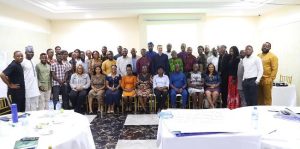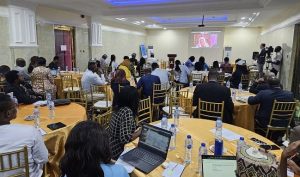Given Nigeria’s physical climate and transition risks, the government has been told to use its position and influence to help champion initiatives that seek to reform the international financial architecture in a way that will help to make it fairer and fit for climate.

Participants at a forum themed “Civil Society Organisations (CSOs) Conference on Debt, Development and Climate Change in Nigeria“ rose at the close of two days of deliberations on Thursday, July 20, 2023, in Abuja, urging the government to join the Emergency Coalition for Debt Sustainability and Climate Prosperity led by the Vulnerable Twenty (V20) Group, rally behind the Bridgetown Initiative and actively engage in the reform package on the international financial architecture suggested by the UN Secretary-General.
The V20 Group of Ministers of Finance of the Climate Vulnerable Forum is a dedicated cooperation initiative of economies systematically vulnerable to climate change. The V20 works through dialogue and action to tackle global climate change. The Bridgetown Initiative, on the other hand, proposes the creation of new institutions to finance climate resilience and the Sustainable Development Goals (SDGs).
“We support the key demands of these initiatives that entail an enhanced Debt Sustainability Analysis that integrate climate and other sustainability risks, and climate resilience benefits, as well as estimates of a country’s financing needs for climate change adaptation, mitigation, and achieving the broader goals set out in the 2030 Agenda for the SDGs,” submitted the delegates, adding that the demands also involve having access to debt restructuring for all debt-distressed, climate-vulnerable low and middle-income countries, and a speeding up of debt relief talks.
They underlined the need for government to boost revenue generation via improved tax compliance by reinforcing the revenue administration and by reviewing tax incentives given to the private sector.
“The plans by the National Council of Climate Change (NCCC) to unveil a carbon tax policy is a welcome development in this regard. Any changes to the tax system should be guided by progressive taxation principles that protect low-income earners and the poor.“

While clamouring the inclusion of disaster clauses in lending deals with public and private creditors to allow a country like Nigeria to divert debt payments to disaster relief, the gathering suggested that any proceeds from potential debt relief to Nigeria should be ring-fenced in a “Green and Inclusive Recovery Fund” managed under the oversight of the NCCC and Debt Management Office (DMO).
“In order to ensure the impact of releases from the fund, a stringent monitoring and accountability framework should be put in place. Such should allow for citizens’ voice and participation, easy tracking of projects by interested stakeholders and ensure value for money,” the participants declared in a communique.
They added: “The summit for a New Global Financing Pact that took place in Paris at the end of June provided some important momentum to the discussion on reforming the international financial architecture in a changing climate. However, the summit was unable to agree on a deceive debt relief plan debt. Urgent action is necessary to provide increased levels of climate finance. This financing should have a greater emphasis on grants and concessional loans to avoid a deepening of the debt crisis.“
While the government was asked to reduce its reliance on borrowings from the international capital market and commercial loans and to strictly adhere to the provision of the law on maintaining concessional loans, the National Assembly was called upon to review the existing legal and institutional frameworks relevant to debt management with the view of closing existing loopholes and strengthening transparency and enforcement.
“For example, the Fiscal Responsibility Commission and Debt Management Office should be empowered to sanction breaches of existing laws and regulations. Lawmakers should carry out loan approvals with proper scrutiny and approvals be subject to public hearings and input. Public disclosure of, for example, the terms and conditions of loans, and borrowing plans are critical steps to increase transparency and accountability in Nigeria,” the participants emphsised.
The conference was organised by the Heinrich Boll Foundation (HBF) in collaboration with African Network for Environmental and Economic Justice (ANEEJ), the Centre for the Study of Economies of Africa (CSEA), the Civil Society Legislative Advocacy Centre (CISLAC), Good Governance Team (GGT) and the Centre for Climate Change & Development (CCCD).
Moderated by Jochen Luckscheiteir and Ikenna Donal Ofoegbu of HBF, the forum featured presentations by Mma Amara Ekeruche, Senior Research Fellow at CSEA; Chinedu Bassey, Programme Manager at CISLAC; David Ugolor, Executive Director at ANEEJ; Jason Braganza, Executive Director at African Forum and Network on Debt and Development (AFRODAD); Ulrich Volz, Director at Centre for Sustainable Finance at SOAS, University of London; and Sadiq Okoh, Research Fellow at CCCD.
By Michael Simire
